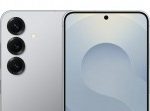To me, autumn feels like a new term in beauty. The seasonal shift calls for a clean slate for our beauty routines, whether it’s switching up our skincare or choosing an autumn perfume, aligning with the moment we begin to pull our coats, jumpers and boots out of hibernation. And who can resist the allure of a new haircut, or even a fresh hair colour to experiment with at this time of the year? As as the dark nights draw in, I’m intrigued to know which autumn beauty trends will be big this year.
When I ask experts about what’s trending in beauty, the idea is sometimes met with reservation. And rightly so. As a beauty editor, I can’t help but notice the trend cycle speeding up. After seeing a number of different aesthetics over summer (I’m looking at you; tomato girl, strawberry girl and latte girl), trends have gone into overdrive, with something new surfacing almost every week, repackaged with a catchy name that reflects the current zeitgeist, and usually kicked off on social media. Celebrity makeup artist and brand founder Lisa Eldridge summed this up perfectly in a recent TikTok video. She explained how, in ancient Egypt, trends would last for hundreds of years. Fast-forward to the ’60s, ’70s and ’80s, and trends would last a decade. The momentum hasn’t stopped, and with the rise of technology and social media, it’s perhaps unsurprising that new trends are coming up every month—or even every week—in 2023.
So, where do we go from here? After speaking to experts about what beauty trends will be big in autumn 2023, one thing became very clear. It’s about making the trends work for you—not the other way around. Everyone is unique, and broad trends aren’t one size fits all. Instead, it’s a level of personalisation, whether it be a haircut that allows your hair type to shine in its natural state, or perhaps a lipstick you adore that will see you through an entire year. It’s new innovations that make your skincare work smarter, or fragrances that help you radiate confidence.
Ahead, you’ll find the beauty moments that will help you be the very best version of yourself on the inside and out this season.
The hardest-working makeup product to update your look for autumn? A statement lipstick. Specifically, worn proudly with little to no makeup. “Bold, burgundy statement lips make a comeback every autumn/winter, but this year they will be paired with completely bare eyes—little to no mascara,” says Chanel makeup artist Anna Payne. “The fusion of bare eyes with a striking lip creates a captivating focus on the lips, allowing them to truly make a bold and impactful statement.”
There’s one trick she recommends to balance this statement look. “A really important thing to remember when wearing a dark lip is to add blush,” she says. “You need to find one with the same base tones as your lipstick, as this will stop you looking washed-out and tie the whole look together. The easiest way to ensure that you get the look right is to use your lipstick as a cheek stain.” Payne’s favourite is Chanel Rouge Allure Velvet in 72 Mystérieuse (£37).
“The ‘soft goth’ look, seen across the A/W 23 runways, is a modern and versatile take on the traditional gothic makeup style,” notes Payne. “It combines elements of gothic and alternative aesthetics with a softer, more subtle approach, creating a look that is both edgy and elegant.” Indeed, we’re turning to the dark side as the nights draw in, with vampy glamour a striking yet very wearable trend for nighttime. “The focus lies on the eyes, with a dark, smudgy and smokey eye in deep plums, rich burgundies, smokey greys and charcoals,” she says.
The “soft” part of this makeup trend comes from the immaculate blending. “Blurred edges and diffused transitions between eye shadow colours and contours give a dreamy and romantic vibe,” says Payne. “The key product to this look is a good kohl liner, such as Chanel Le Crayon Khôl in 61 Noir (£26). Keep the lips subtle and polished, allowing the eyes to take centre stage. To balance the dramatic eyes, a neutral lip colour works best. Stick to deep nudes, dusty pinks or mauves,” she says.
When it comes to our makeup bags, we’re putting them in neutral. Think earthy tones that complement your skin tone whilst adding definition to eyes, lips and cheeks. “A modern take on the ’90s monochrome look is back for autumn/winter. This trend embraces a variety of browns, terracottas, burnt oranges and soft taupes to create a soft, captivating eye that is then echoed across the rest of the face, evoking a sense of harmony,” says Payne.
“Chanel Ombre Premiere Libre eye shadows (£34) are perfect for creating this look, and come in a range of natural, earthy shades,” she says. “Start by applying a wash to your eyelids and blending it well for a soft, diffused effect. Apply the same eyeshadow along your lower lash line, connecting it with the shadow on your lids, then add plenty of mascara and find a lipstick with the same undertone to match your eyes.”
It’s been a while since we’ve seen grey nails doing the rounds, and it feels fresh again as we head into the new season. Whilst black and white can often feel stark, there’s a shade of grey to suit every skin tone and mood. “Short, pale, powdery grey nails with a high-gloss finish,” says Julia Diogo, resident manicurist at Liberty London. “Start by trimming and filing nails into a soft square shape, apply two coats of grey polish to nails and finish with a high-shine topcoat—the glossier, the better,” she says.
Black nails never go out of style, but Diogo predicts that we can expect to see more of them as we head into the season. “We’re going to see glossy black manicures on a short, soft square nail shape,” she says. Short nails are key to keep the effect timeless without venturing into Halloween territory.
Darker nail colours like black can be more noticeable when it comes to chipping, so if you’re opting to use polish rather than gel, choose a long-wearing topcoat and reapply every couple of days to prevent damange and keep your nails looking glossy.
Whilst colourful French manicures have dominated this past summer, we can expect them to stay put, but in autumnal hues. “This look features a nude base to suit the individual skin tone, paired with a micro black French tip,” says Diogo. “Apply two coats of sheer, nude polish. Using a fine-liner brush, begin to detail a black micro French tip, finishing with a glossy topcoat to seal the look together.”
Darker hues lend brilliantly to contrasting textures, so experiment with matte and gloss topcoats to elevate the trend. Don’t have a steady hand? Opt for a fine brush for painting precise lines, or choose press-ons that give you an instant manicure without the fuss of DIY nail art.
As the season turns, we’re calling a red alert for all salons. From strawberry brunette to copper and fox red, we can expect to see every red hue trend this autumn, says James Samuel, colourist at Hershesons. “Dimensional bronze and coppers are the perfect antidote to sun-bleached hair. It’s deeper shades with pops of lighter pieces in a rich, warm tone,” he says. “This can be tailored to naturally lighter or darker hair, with deep golds and strawberry tones for blondes, or bronze and copper for darker shades.”
Rather than a blanket block of colour, this trend looks best with multi-dimensional hues that bring the hair to life. “If the hair has lots of highlights, I like to add lowlights to create pockets of depth, which adds dimension. I smudge and tone the remaining lighter hair using different glosses, resulting in warmer and shinier hair,” says Samuel. “If the hair is mostly natural then I will add lighter pieces to the hairline, parting, and tips of the hair. By leaving the roots underneath you will get natural shadows that contrast the warmer, lighter pieces.”
Red hair is notoriously prone to fading, so investment in good haircare products and treatments that will keep your hair colour lustrous throughout the season.
Whilst we’ve seen highly layered hair and bouncy blowouts reign over the past year, they can be high maintenance. This autumn, we’re ushering in haircuts that work for our hair, rather than trying to make our hair work for the trends. Samuel Broadbent, hairstylist at Hershesons, coins this the “life’s too short layers”, which means carefully cut layers that look great with little to no styling.
“Chunky layering often requires a blowdry to look good, so softer layers, whether long or short, will create natural texture and movement and easily sustain both air-drying and heat styling,” he says. Think low-maintenance hair that looks great, no matter your texture. “Who isn’t asking for layers that flow in the autumn wind this season? But if you don’t have the time or know how to style them at home, fear not—don’t be afraid to ask for what you want,” says Broadbent. “For those with natural curls, the cold weather will create more of a need for diffusing versus air-drying, with a higher priority placed on using curly-hair products to prevent frizz. For this, I recommend cocktailing Living Proof Curl Definer (£33) and Curl Gel (£27) for both nourishment and maintaining definition.”
Some tactical layering is a great way to lessen your reliance on heat styling, which is a plus if your hair is currently frazzled from summer, too. “When the weather changes and your fresh colour has been frazzled by the sun, I recommend Living Proof Triple Bond Complex (£42) for a full hair recovery ready for autumn. And as a one-stop anti frizz finisher, Hershesons Almost Everything Cream (£12) is a must to tame flyaways at the roots and ends.”
Summer’s trending bob haircuts aren’t going anywhere in autumn, FYI. But if you’re wanting to grow yours out, the shag makes for a chic transitional choice to ease your hair into a longer length. It’s also a great cut if you already have long hair but want more body and movement in your lengths. “This autumn’s predicted hair trend is the soft shag, which is great for those rainy days as it involves zero-effort styling, minimal product and works on straight, wavy or curly hair,” says Conor McLaughlin, expert and hairstylist at Hershesons. “We’re looking for maximum texture, so using a razor is ideal when cutting this,” he says.
We’re well-acquainted with French and Japanese skincare, but those in the know predict that skincare from all over Africa will soon be taking the spotlight. “I think we’re going to see the rise of African beauty,” says Dija Ayodele, founder of Westroom Aesthetics and Black Skin Directory. “We’ve had Korean beauty, we’ve had Japanese beauty and we have French heritage skincare. But I definitely think we’re going to see African beauty and African botanical ingredients getting much more play as well.”
Qasil, a plant native to Somalia, has been cropping up in skincare such as S’able Labs’ Qasil Cleanser, which helps to brighten whilst offering inflammatory properties. Skincare brand Epara sources its botanicals from all over the continent, calling upon Ghana for shea butter, moringa oil from Kenya and argan oil from Morocco to create its luxurious line of efficacious products. “We have brands like The Natural Africa, which also champions the use of these botanical ingredients, such as the resurrection plant and African immortelle plants,” says Ayodele.
Prebiotics, gut health and the skin microbiome (or skin barrier) have been garnering attention for a while now. However, it’s postbiotics that have taken centre stage in skincare launches of late. “I’m noticing a lot of conversation around the microbiome,” says Ayodele.
“For years we have spoken a lot about protecting the skin barrier. I think that conversation is going to move on to be more about the microbiome, and that’s where postbiotic skincare comes in, because that’s really about ensuring that we have balanced, soothed skin,” she says. Think anti-inflammatory and skin-repairing ingredients that support the skin’s natural microbiome. “We already use things like lactic acid, which is technically a postbiotic ingredient. But I think you’re going to hear the term a lot more,” says Ayodele. “And we’ve also got the things like ferments, such as lactobacillus ferment and lactobacillus ferment lysate as well, which are a postbiotic.”
You can expect to find these ingredients in pharmacy favourites such as Avène, and also newer skincare brands like Soho Skin that are harnessing the benefits of good bacteria.
Price shown is members’ price.
Whether it be scarring, sun damage or melasma, pigmentation can come in many forms and can be a tricky concern to treat. However, brands are tapping the benefits of pigmentation powerhouses to help aid clearer skin. According to Black Skin Directory, demand has increased for these solution-based skincare products. “There’s still a massive desire for skin-brightening ingredients,” notes Ayodele. “Ingredients like glutathione, tranexamic acid and hexylresorcinol—all those sorts of really high-level, skin-brightening, pigmentation-fading ingredients—are going to have a bit of a spotlight on them. Hexylresorcinol has been picking up in the last few years and we’re starting to see it included in more easily accessible products, such as the brand 4.5.6 Skin,” she says.
“For the skin-of-colour consumer who is looking for more heavy-hitting ingredients when it comes to pigmentation, I think these are the sorts of ingredients that we’re going to be talking about the most, which is moving on from things like alpha arbutin and kojic acid, which are very helpful, but these higher-level ingredients are going to come to the fore more,” says Ayodele.
Incense, frankincense, myrrh, oud—they’re just a handful of the fragrances you might associate with places of worship, and these sacred notes have been making their way into new perfume launches and autumnal scents of late. Le Labo’s City Exclusive Myrrhe 55 fragrance celebrates the earthy, resinous scent of myrrh (a resin considered to be so sacred that it was once more valuable than gold), as does Tom Ford’s new Myrrh Mystère, which cloaks the wearer in a warming, radiant, amber-wood scent. Meanwhile, Aesop’s new launch Ouranon features both myrrh and frankincense in its spicy scent profile that unfurls from the skin. D.S & Durga’s Amber Kiso is inspired by Japan’s sacred Kiso forest, where the wood of hinoki trees is used to build temples and shrines.
We’re accustomed to spritzing our scents on our pulse points, but more and more brands have been innovating the ways in which we fragrance ourselves—from head to toe. Take Selahatin, a Swedish brand which elevates the act of brushing your teeth into a luxurious, fragranced ritual. With scented toothpaste, mouthwash and its range of Eau D’Extrait Oral sprays, it features considered notes such as lime, eucaplytus and peppermint that elevate beyond standard mint toothpaste. Meanwhile, Marc Jacobs’ ampoules contain a fragranced gel that bursts for an olfactive experience on the go. And Byredo has extended its scented hand cream offering with De Los Santos, which clouds hands in an alluring scent of musk and amber.
The lines between fragrance and aromatherapy are continuing to blur, with fragrance houses tapping the mood-boosting benefits of aromatherapy for perfumery and home fragrance. Take Vyrao, for instance. Vyrao founder Yasmin Sewell combined energetic healing with master perfumery to create scents that not only smell good, but directly boost your mood. Each fragrance features a “spray and say” manifestation, as well as a crystal inside each bottle to amplify the energy the scent brings. “I’ve always worn fragrance for myself rather than for others, and I wear it to amplify my energy. It’s about ritualising your routine, stating your intentions for the day by taking a moment for yourself,” says Sewell.
Byredo’s new candle launch, Sweet Grass, features clarifying sage and palo santo to clear negative energy, whilst Marks & Spencer’s Apothecary Warmth fragrance continues to be a best-selling fragrance, with its blend of wellbeing notes like sandalwood and cinnamon leaf to calm the mind and lift the spirits. And Diptyque’s latest candle range, Les Mondes de Diptyque, features Temple des Mousses, a candle scent inspired by the meditative zen gardens of Japan to help you unwind and relax.







